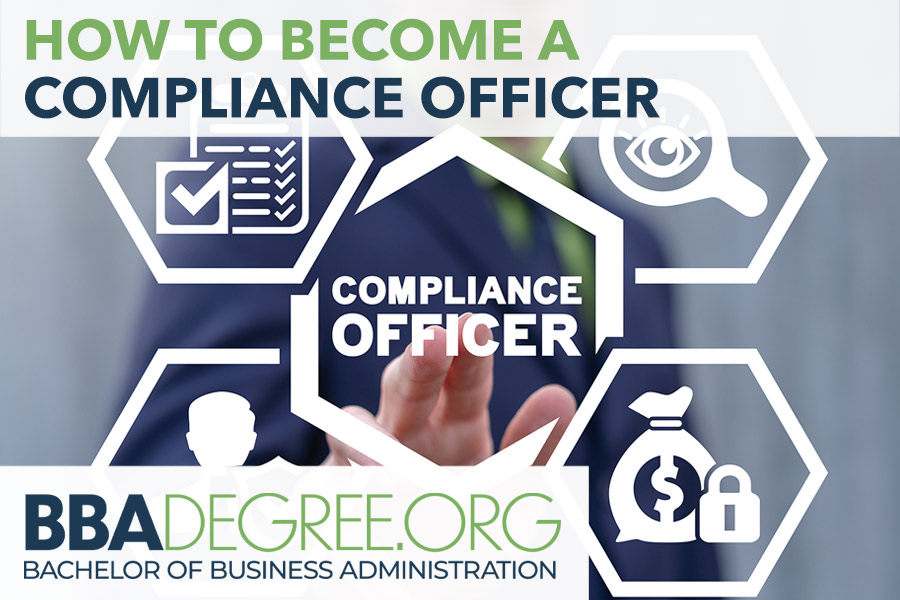How to Become a Compliance Officer

Compliance officers are critical in ensuring that organizations operate within legal and regulatory frameworks. They are responsible for developing and implementing compliance programs, monitoring activities, and mitigating risks of non-compliance. If you are detail-oriented, have a strong sense of ethics, and enjoy working in a dynamic and evolving field, pursuing a career as a compliance officer may be a suitable path for you. Below, we will outline the steps to becoming a compliance officer, including education, certifications, salaries, and job opportunities.
What Is a Compliance Officer?
A compliance officer is a professional who ensures that organizations adhere to relevant laws, regulations, and internal policies. They work across various industries and are responsible for promoting ethical conduct, managing risks, and preventing legal violations. Here are some typical job duties and responsibilities of a compliance officer:
- Developing and implementing compliance policies and procedures.
- Conducting risk assessments and identifying potential compliance issues.
- Monitoring and auditing business activities to ensure adherence to regulations.
- Providing guidance and training to employees on compliance-related matters.
- Investigating and reporting any suspected non-compliance or misconduct.
- Keeping up-to-date with regulatory changes and ensuring organizational compliance.
- Collaborating with internal teams, external auditors, and regulatory agencies.
RELATED: Learn about other BBA Careers.
Step 1: Complete a BBA Degree
Obtaining a Bachelor of Business Administration (BBA) degree or similar is often a recommended educational pathway for aspiring compliance officers. A BBA degree provides a broad understanding of business principles, ethics, and legal frameworks. Consider the following aspects when pursuing a BBA degree:
- Relevant Concentrations: Some universities offer concentrations or specializations in areas such as compliance, business ethics, or risk management. These concentrations can provide specialized knowledge and skills directly applicable to compliance.
- Typical Curriculum: The BBA curriculum often includes courses in accounting, finance, business law, ethics, organizational behavior, and risk management. Elective courses focusing on compliance, regulatory frameworks, and corporate governance are also available.
- Online Program Options: If you require flexibility due to work or personal commitments, consider online BBA programs that offer coursework in compliance and related subjects. Ensure that the program is accredited and recognized by reputable institutions.
- Internships and Experiential Learning: Seek internships or part-time positions in compliance departments or related fields. These experiences will provide practical exposure to compliance activities and enhance your understanding of the profession.
Step 2: Determine If You Need Any Certifications to Become a Compliance Officer
Certifications can demonstrate your expertise and commitment to the compliance profession, although they are not always mandatory. Depending on your career goals and the industry you wish to work in, consider pursuing the following certifications:
- Certified Compliance and Ethics Professional (CCEP): Offered by the Society of Corporate Compliance and Ethics (SCCE), the CCEP designation validates your knowledge of compliance and ethics. It requires passing an exam and meeting certain experience requirements.
- Certified Regulatory Compliance Manager (CRCM): Provided by the American Bankers Association (ABA), the CRCM certification focuses on regulatory compliance within the banking industry. It requires passing an exam and demonstrating expertise in areas such as consumer protection, lending compliance, and bank operations.
- Other Industry-Specific Certifications: Some industries, such as healthcare or finance, may have specialized compliance certifications. Research and identify certifications that are relevant to your desired industry or regulatory focus.
While certifications can enhance your credentials, gaining practical experience and developing a strong understanding of relevant regulations and compliance best practices are equally important.
Step 3: Learn About Compliance Officer Salaries
Compliance officer salaries can vary depending on factors such as experience, industry, location, and the size of the organization. According to the Bureau of Labor Statistics (BLS), the median annual wage for compliance officers in the United States was $71,690 as of May 2021. However, salaries can range significantly, with experienced professionals and those in leadership positions earning higher incomes.
Additional factors that may influence compliance officer salaries include the complexity of the organization’s compliance program, the level of responsibility, and the demand for compliance professionals in a particular industry or region. As you gain experience and expertise, you may have opportunities for salary growth and advancement within the field.
LEARN MORE: Explore what a BBA Salary entails.
Step 4: Find a Job as a Compliance Officer
Compliance officers work in various industries and organizations that prioritize regulatory compliance. Some typical workplaces and organizations that hire compliance officers include:
- Corporations: Large and multinational companies often have dedicated compliance departments to ensure adherence to regulations.
- Financial Institutions: Banks, insurance companies, and other financial institutions require compliance officers to navigate complex regulatory frameworks and ensure compliance with laws and industry standards.
- Healthcare Organizations: Compliance officers in the healthcare sector focus on areas such as patient privacy (HIPAA), fraud and abuse (False Claims Act), and healthcare regulations (Medicare/Medicaid).
- Regulatory Agencies: Government entities responsible for enforcing regulations employ compliance officers to monitor and enforce compliance across industries.
- Consulting Firms: Compliance consulting firms provide specialized services to organizations seeking to establish or enhance their compliance programs.
- Nonprofit Organizations: Nonprofits must comply with regulations related to fundraising, governance, and transparency, making compliance officers crucial in ensuring adherence.
To find job opportunities, utilize online job boards, professional networking platforms, and industry-specific resources. Network with professionals in the compliance field, attend industry conferences and events and consider joining professional associations related to compliance and governance. Developing a strong professional network can lead to valuable connections and job leads.






















